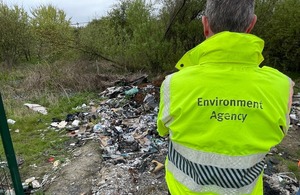Environment Agency urges property and landowners to be vigilant in stopping waste criminals
Environment Agency warns property and landowners to secure premises against criminals who dump illegally collected waste

The Environment Agency is today (21 August) warning property and landowners to be vigilant and secure their premises against criminals who target their land and buildings to dump illegally collected waste.
Networks of organised criminal gangs operating across the country are targeting privately owned property and land, particularly in rural locations, to dump rubbish collected through illegal means.
In 2023, the Environment Agency’s National Waste Crime Survey found 85% of the landowners and farmers who took part reported being affected by small-scale fly-tipping and 20% by large-scale fly tipping. This June, research conducted by the National Farmers Union also revealed 85% of respondents felt the problem of fly-tipping in their area had either not changed or become worse in the last five years.
If waste is dumped on privately owned land, it is the responsibility of the property or landowner to clean it up at their own expense. Those affected can face costs of more than £200,000 to clear illegally dumped waste from their premises.
Waste crime costs the economy in England an estimated £1 billion a year through evaded tax, environmental and social harm, and lost legitimate business, with enough waste managed illegally across the country to fill 4 million skips annually – about 34 million tonnes.
The Environment Agency is taking action against these criminals, conducting site inspections and prosecuting guilty parties to the full extent of the law. But it’s essential that everyone affected works together to tackle this issue, which is why we are running an awareness campaign to educate, promote behaviour change and drive action amongst society to stop waste criminals for good.
Property and landowners are urged to follow these simple steps to protect themselves against waste criminals trespassing on their premises:
-
Check any empty land and property regularly and make sure it is secure.
-
Carry out rigorous checks on prospective and new tenants. Property and landowners are responsible for ensuring anyone leasing their property and land complies with regulations. They are committing an offence by allowing waste to be stored on land or property without the relevant permissions. This could leave them liable to prosecution.
-
Be vigilant and report any suspected illegal waste activity to the Environment Agency’s 24-hour incident hotline: 0800 80 70 60.
Steve Molyneux, Environment Agency Deputy Director of Waste Regulation, said:
Our environment is a precious resource and one we need to guard now and for the next generation, but there are networks of criminal gangs operating across the country just waiting to spoil it for everyone.
They may offer owners cash to store waste at their property or on their land, promising to remove it later. They won’t. Some don’t ask. They break in, dump waste they’ve illegally collected and disappear.
Waste criminals need access to places to dump the rubbish they illegally collect – but your vigilance can stop them. Shutting them out of property and land is just one tactic to scupper these rogues.
Country Land and Business Association President Victoria Vyvyan said:
Fly-tipping is a crime that is blighting rural communities. Farmers and landowners bear the cost of removing rubbish and they pay on average £1,000 to remove waste. This is not a victimless crime – in some cases they have paid up to £100,000 to clear up other people’s mess or risk facing prosecution themselves.
It’s not just litter blotting the landscape, but tonnes of household and commercial waste which can often be hazardous – even including asbestos and chemicals – endangering farmers, wildlife, livestock, crops and the environment.
Waste crime is toxic and causes widespread and significant harm to people, places, the environment, the economy and law and order. These criminals are often involved in other types of serious offending such as those involving drugs, firearms and human trafficking. They use violence and intimidation and make huge profits by not paying tax.
The Environment Agency works with a range of partners including the police, HMRC and DVSA to stop waste criminals.
In September last year, the Environment Agency took the company director of GB Waste Management in Lemington, Newcastle upon Tyne, to court for allowing his waste company to dump asbestos-contaminated waste on farmland. The court ordered him to cover the cost to the landowner of clearing the waste that was not covered by their insurance, a total bill of £32,000.
Everyone can help the Environment Agency to combat waste crime by ensuring they do not hand their own rubbish to the wrong people. Find out how to dispose of household waste here.
For more detail on our actions to tackle rural waste crime, please see our blog.